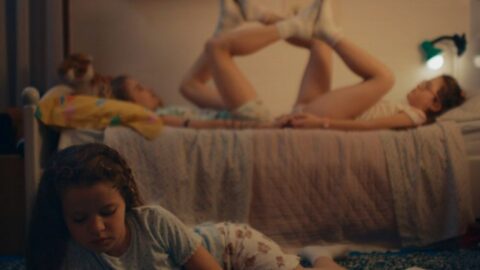Props to Nicole and Valentina Bertani for taking a bold swing with their debut film, Mosquitoes (2025), an offbeat coming-of-age story set in ’90s Italy. It follows three young girls growing up way too fast — and in a genre often bogged down by overused themes/imagery/stock characters, Mosquitoes manages to sidestep a lot of that. The result is something messy but weirdly intriguing. Does it all come together? Maybe. Not really. But it throws enough wild, interesting ideas at the wall to make it worth your time.
Eva (Clara Tramontano) uproots herself and her feisty eight-year-old daughter, Linda (Mia Ferricelli), leaving behind the comfort of her wealthy mother’s Swiss condo to return to Ferrara, Italy. There they meet Azzura (Agnese Scazza) and Marta (Petra Scheggia), two sisters living with their eccentric parents — a former nurse who’s abandoned her profession to make dolls, and a nearly mute, chain-smoking surgeon. Their apartment block is filled with odd characters: a nosy, domineering woman and her adopted daughter, adult twin brothers who speak in perfect unison and never leave their apartment, and Carlino (Milutin Dapčević), a gay babysitter who occasionally looks after the girls.
Things start to unravel when Eva reconnects with an assholish old flame who pulls her back into heroin use. What follows isn’t a typical sun-soaked coming-of-age story; it veers into something far more unsettling, following the three girls as they try to navigate the dangerous, weird world around them.
Mosquitoes can best be described as The Florida Project (Sean Baker, 2017) by way of Jennifer Reeder (Knives and Skin, 2019; Perpetrator, 2023), with a hint of David Lynch’s unsettling touch. Like Baker’s film, it unfolds from the kids’ perspective, grounded in a kind of stripped-down neo-realism. But this grounded approach is then put through a hyper-stylised, retro-artificial blender — complete with a synth-heavy soundtrack and enough colour grading to make your eyes bulge out their sockets. The film inhabits a weird liminal space between the real and the uncanny: self-consciously composed while flirting with a surreal, icky atmosphere, something that constantly prevents it from fully immersing us in genuine emotional depth.
The child actors are remarkable, bringing precocious wit with a biting, understated sarcasm. Beneath the surface lies a weary tension — they carry themselves like kids who’ve been hurt before and are simply waiting for the next blow. Their dissatisfaction isn’t always overt; it hums like a low, constant fury, present in every distrustful eye-roll. Despite the burden they carry, their sharp, often darkly funny chemistry when they’re alone together sustains a connection with the audience even as the narrative stagnates.
There’s a thread running through the film about how the women in Eva and Linda’s family share something like a sixth sense — an almost witchy ability to feel each other’s presence, to know things before they’re said. But for all that intuition, they can’t quite figure out how to love each other in a way that lasts or heals. Tramontano brings a sad tenderness to a role that could’ve been just another cautionary heroin addict tale. Her character clearly loves her daughter — but addiction keeps her at arm’s length, and no amount of intention can close that gap.
Oh yeah, we need to talk about Carlino — the gay babysitter with a standout lewk: part Jimmy Savile, part Chris from It’s Pat: The Movie (Adam Bernstein, 1999), thanks to a diabolical haircut and a taste for women’s blouses. He’s obsessed with Gianni Versace and Princess Diana, and is secretly carrying on an affair with the man who works at the local ice cream shop.
It’s hard to say exactly how the filmmakers feel about Carlino. He’s not reduced to a punching bag, but his portrayal leans heavily on familiar clichés — camp, mincing, living with his mom, etc. He fits the “only gay in the village” archetype, which, while clumsy and stereotypical, somehow works here. Some might read him as gender non-conforming (he later shows an interest in drag), though that layer is never fully explored. Still, Carlino is one of the few who truly cares for the girls and shows up when it matters, coming through in a crucial moment of abandonment. In the end, his queerness doesn’t define his fate, but the humiliating spectacle he endures at the film’s climax — at the big end-of-summer party in front of a church with a neon cross — feels a bit…off.
That party marks the film’s big crescendo, after which all this heightened reality crashes into a very traumatic, very real development that’s not exactly a big surprise. We get a massive — and I mean massive — needle drop that plays over the aftermath, a moment that’s both annoyingly on the nose yet still stirs a sense of hope and wonder. Not everyone can employ the big Eurodance banger as effectively as Beau Travail (Claire Denis, 1999) or Uncut Gems (Benny and Josh Safdie, 2019) but here it puts a cherry on top of Mosquitoes‘ odd blend of artificiality and emotion, leaving you moved but a little uncertain about what you just experienced.
Editor-at-large Jared loves movies and lives with Kiki in Berlin.





